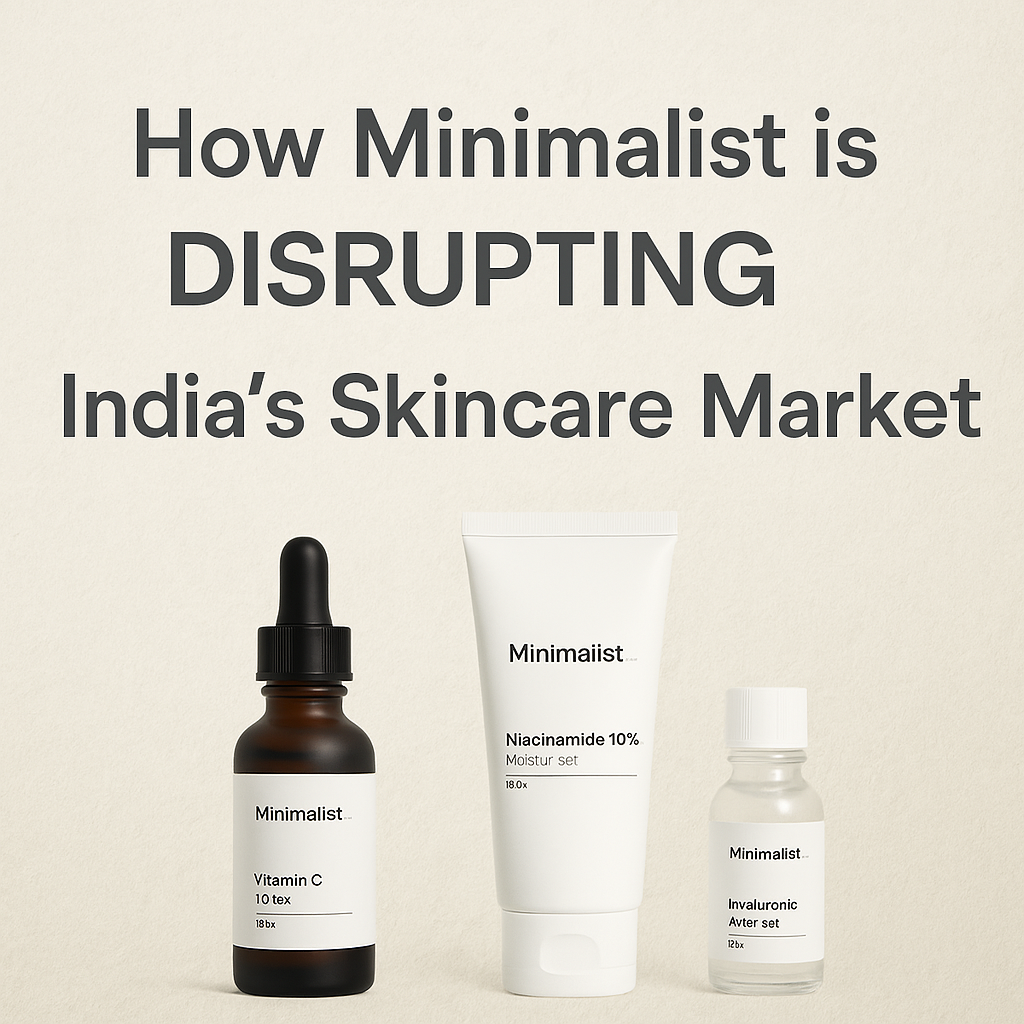The Rise of Minimalist: A Skincare Revolution
This skincare company makes more than 360 crores in annual revenue and has taken India’s entire beauty industry by storm in just three years. Minimalist is a new-age, D2C profitable startup that is disrupting India’s 16,000 CR skincare market. What makes this startup even more interesting is the fact that they made 100 crores in just eight months of inception by creating a loyal fan base all across the country.

So, what are the key insights that worked for Minimalist, and why is beauty and personal care a booming industry right now? Let’s dive into the details.
The Founders’ Journey
Minimalist was founded by two brothers, Mohit and Rahul Yadav, who are serial entrepreneurs with previous business ventures. They previously built and sold a kids’ fashion company called Mango Street back in 2012, worked in senior roles at startups like Cardo, and even started a beauty and personal care brand called Freewell in 2017. Their journey helped them identify a great opportunity in India’s beauty and personal care market.
The Growth of India’s Beauty Market
India’s beauty and personal care (BPC) market is witnessing rapid growth, with an expected annual growth rate of 10%. It is projected to reach $30 billion by 2030, up from $20 billion today. The market is vast and segmented into multiple categories, including skincare, haircare, oil care, cosmetics, bath, and shower. Among these, the top three categories have been bath and shower, hair care, and skincare.

The Yadav brothers identified the skincare segment as their primary target, but instead of following conventional trends, they decided to enter the category with a unique proposition: active ingredients.
The Category Creation Insight: Active Ingredients
Active ingredients are skincare chemicals that target specific skin issues such as wrinkles, dryness, and smoothness. Although these chemicals were already present in existing products, no major brand in India was selling them as standalone solutions.
Historically, Indian consumers purchased skincare based on three key factors:
- Brand familiarity (e.g., L’Oreal, Nivea)
- Gimmicky claims (e.g., “natural,” “organic”)
- Insecurity-driven marketing (e.g., fairness creams)
However, the Indian market was evolving. People were becoming more conscious of their skincare choices, similar to how consumers now read food labels. Minimalist leveraged this shift by positioning itself as a science-backed, transparent skincare brand.
Building Trust Through Transparency
With increasing competition from brands like Foxtale, Deconstruct, Pilgrim, and The Ordinary, Minimalist focused on building trust. They cracked the repeat purchase rate, achieving an impressive 60% repeat rate by ensuring high product quality.
Unlike many D2C brands that rely on third-party manufacturers, Minimalist took the high capital expenditure approach by moving production in-house. This allowed them to control quality and formulation, a strategy likely influenced by Rahul Yadav’s background in chemical engineering.
Additionally, Minimalist sourced higher-quality raw materials, which were 40-50% more expensive than most beauty brands. This increased their cost of goods sold (COGS), but the brand believed that investing in product quality would drive organic word-of-mouth marketing, reducing their long-term marketing spend. While most brands in the industry spend 40-50% of revenue on marketing, Minimalist spends only around 25%.
Expanding Access and Market Penetration
To ensure accessibility, Minimalist positioned itself in the affordable price range (INR 200-600 per product). The brand tapped into India’s expanding middle class, ensuring affordability without compromising on quality.
They also expanded beyond skincare into body care and hair care, now offering over 50 products. Notably, 10% of their sales already come from international markets, including the UK, US, Gulf countries, and Southeast Asia.
Additionally, Minimalist plans to open 100 exclusive brand outlets (EBOs) to strengthen its physical retail presence. Unlike supermarket shelves where their products would be lost among competitors, these EBOs will allow Minimalist to educate customers in a dedicated setting, aligning with their philosophy of transparency.
Conclusion
Minimalist has successfully disrupted India’s skincare market through category creation (active ingredients), trust-building via transparency, and smart market expansion strategies. With strong revenue growth, high customer loyalty, and aggressive international expansion, Minimalist is well-positioned for long-term success.
FAQs
Why is the Indian skincare market growing so fast?
The rise in disposable income, increasing consumer awareness, and global beauty trends are driving India's skincare market growth. Consumers are now more informed about ingredients and willing to invest in effective products.
How does Minimalist ensure product quality?
Minimalist manufactures its products in-house, sources high-quality ingredients, and maintains stringent quality control. This approach ensures consistency and superior product performance.
Where can I buy Minimalist products?
Minimalist products are available online through their website, major e-commerce platforms, and select international markets. The company also plans to open exclusive brand outlets soon.
What are Minimalist's future expansion plans?
Minimalist aims to expand into more international markets, increase product offerings, and open 100 exclusive brand outlets across India.
1. What makes Minimalist different from other skincare brands?
Minimalist focuses on active ingredients and complete transparency, displaying ingredient percentages on packaging. Unlike many brands that rely on gimmicky claims, Minimalist provides science-backed skincare solutions.
2. Why is the Indian skincare market growing so fast?
The rise in disposable income, increasing consumer awareness, and global beauty trends are driving India’s skincare market growth. Consumers are now more informed about ingredients and willing to invest in effective products.
3. How does Minimalist ensure product quality?
Minimalist manufactures its products in-house, sources high-quality ingredients, and maintains stringent quality control. This approach ensures consistency and superior product performance.
4. Where can I buy Minimalist products?
Minimalist products are available online through their website, major e-commerce platforms, and select international markets. The company also plans to open exclusive brand outlets soon.
5. What are Minimalist’s future expansion plans?
Minimalist aims to expand into more international markets, increase product offerings, and open 100 exclusive brand outlets across India.










